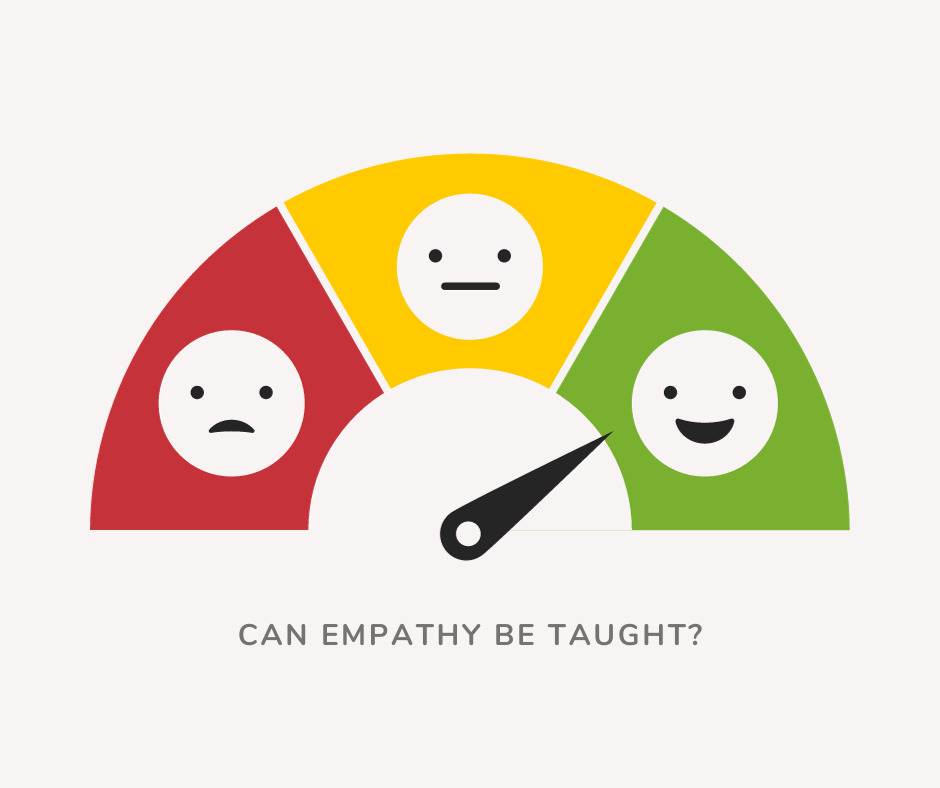Coaching for Empathy

This article is written for you if you use a coaching approach in your leadership role and was first published in Coaching at Work magazine.
Can empathy be ‘taught’ or ‘coached’?
This is often a question that comes up in coach training and supervision with several interesting opinions.
My answer is that empathy can be taught and learned ‘most of the time’ with some exceptions.
For the purposes of this short article, I’m going to ‘assume’ that the person you are coaching can learn to demonstrate empathy and compassion and the tools and ideas I am going to share with you will help on that journey.
What is empathy?
Very simply put, we understand empathy as ‘putting ourselves in someone-else’s shoes.’
Empathy fuels connection with others.
Broadly speaking there are considered to be three types of empathy (in fact there are many nuances when it comes to empathy but today I am keeping things fairly high level and I recommend further reading on this topic).
Three types of empathy
Cognitive empathy – you logically understand how someone might think or feel but don’t feel it yourself. ‘(I get that you feel that way but……..’). This is empathy from knowledge rather than emotion.
Emotional empathy – feeling another’s emotions and connecting with someone else on a ‘feelings’ level.
Emotional empathy can truly help connection but a word of warning. If our emotional response to people is on full alert all the time, we can fall into the ‘empathy trap’ and become so focused on others’ needs we neglect our own. When we do that, we can damp our feelings down so much they ‘pop up’ like a champagne cork or cause us to feel anxiety and stress because we are not getting our own emotional needs met.
Compassionate empathy – When we feel compassion we are able to truly hear someone but – and this is important in our coaching work – also help them to take action or move forward.
It’s clear that empathy and compassion are generally good things to have in this world!
So how do we help someone who doesn’t seem to ‘do’ empathy or compassion – and it’s problematic for them and those around them?
Firstly, the person you are coaching is probably not saying to you ‘I need more empathy’; it’s more likely that they’re struggling with relationships, they’ve had feedback that they’re unapproachable or they don’t listen or they expect people to come into work and work long hours whatever their personal or family circumstances or they’re not a ‘team player’. Many of these things could be about empathy or lack of it.
There is no one-size-fits-all approach, but I’m going to share with you some of the things I’ve done with people I coach to help them develop their empathy.
One – At the risk of stating the obvious, you need to demonstrate and role model empathy and compassion and curiosity for the person you are coaching.
Because coaching is non-judgemental – and coaches are extremely compassionate and empathic, right?
Well, the truth is that certain people will press our buttons and we might find it hard to feel or show empathy and compassion for them. Our cognitive biases may mean we find it much easier to empathise with someone ‘like us’ or someone who has similar values, beliefs or a view of the world that matches our own.
That’s to be celebrated – we’re complex human beings – and doing the inner work and recognising where we struggle with empathy and compassion ourselves is valuable self-awareness. Take this to supervision.
Two – Curiosity. That great coaching skill of remaining curious about what someone believes will give us lots of insights into how they view the world and why they seem to lack empathy. That ‘first seek to understand’ rule is critical.
Three – Is this person rarely able to show empathy or has something happened recently? I recently worked with Managing Director Michelle – she had loads of patience, spent time and energy developing her team, coaching them, listening to their concerns… until she didn’t. A number of things had happened in her organisation, one of which was a significant crisis, and she simply ‘ran out’ of empathy and patience. She recognised that she could be empathetic ‘up to a point’ but needed to replenish her tank. So that’s what she did and she will now recognise when her tank is getting low next time.
Four – Unpick the beliefs that drive the ‘lack of empathy’ behaviour and understand someone else’s map of the world.
If you’re coaching people at work, ask them what they believe to be true about work – or about leadership.
Here’s some expressions I’ve heard recently:
‘People come to work to work and they need to leave their baggage at home’
‘My role is to fix things fast – I don’t have time to listen to everyone’s opinions.’
‘We have to be ruthless if we’re going to hit our targets this quarter.’
The more you can understand someone’s thoughts the more you can understand why they do the things they do and help them see other alternatives that may smooth their path and build connections and relationships. Challenging someone’s thinking with love is a key coaching skill.
Questions like:
‘Is that always true?’
‘What if the opposite were true?’
‘Would that be true for everyone?’
Five – Use of self as instrument. This is I believe one of the most under-used skills in coaching. Very simply put, it’s quite likely that the impact the person you are coaching has on you is the impact they have on other people. Coaches often shy away from sharing their observations about impact because they’re worried it might not land well (‘it wouldn’t be compassionate’!) or they might be ‘wrong’ or they’re putting their own ‘stuff’ into the coaching (their own cognitive biases if you like). Again, this is another great topic to explore in supervision.
But here’s the thing – if you’re not helping the person you coach to see their blind spots, you’re missing a big opportunity. You could even be colluding with keeping them stuck. In my supervision work, I often ask my clients to tell me what they observe about the person they are coaching and what they think, feel or are aware of in their presence – and to not censor themselves! We then look at how they can stop metaphorically sitting on their hands and give that feedback to the person they coach – with compassion, with care and because they truly want them to succeed.



